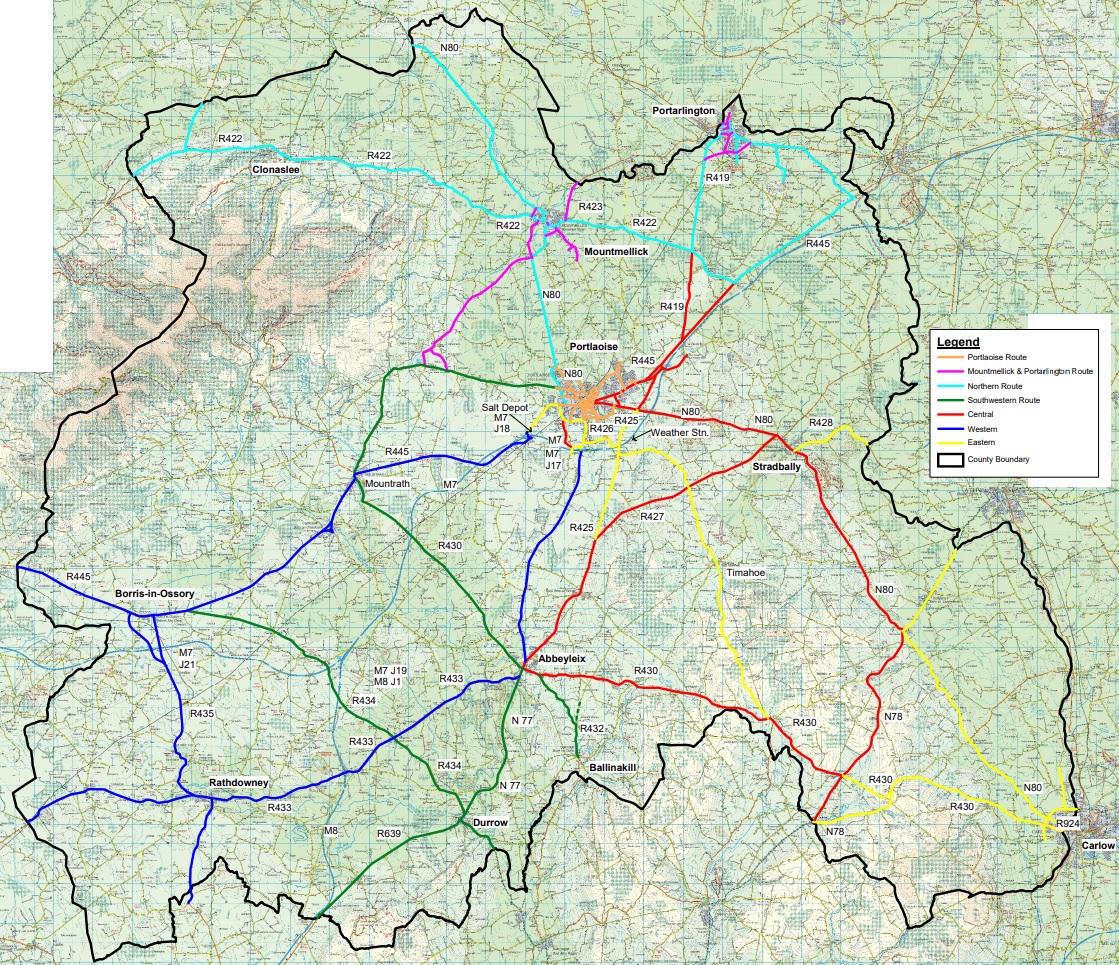
An icy road warning.
Laois County Council has refused to add a short stretch of hilly road at a village school to its winter de-icing route.
Chapel Street in Ballyroan is the location of Scoil Eoin Phoil Naofa primary school, with about 180 pupils.
The council says it is already "maxed out" with the existing 500km of main Laois roads it sprays with grit and salt to keep it clear of ice. It says it cannot add more without money from the Department of Transport.
Most of the county's roads are left untreated.
Cllr Barry Walsh says he cannot understand why the stretch of road in Ballyroan cannot be included.
He tabled a motion to the December meeting of Portlaoise Municipal District asking Laois County Council to include the street. He said the road has a steep incline down to Main Street.
"A number of near misses were reported to me recently," Cllr Walsh said.
"I brought this up before. It's an extremely busy school route. Any time there is frost and ice I get calls about near misses.
"Our traffic survey showed 550 vehicles a day through Ballyroan and I guarantee you the majority are during the school period. Can we substitute another area?" he asked.
Area engineer Paul McLoughlin said there is "nothing left in the gritter" after they treat their selected routes using eight spreaders.
"At the minute we are maxed out. We treat 500km a night, sometimes twice, it takes 3.5 hours per route. You cannot leave a spot ungritted," he said.
"I don't accept that, it's busy, it's a sharp ascent, it has to be done," Cllr Walsh said.
Other councillors support his call for more gritting.
Cllr John Joe Fennelly urged the council to look at increasing capacity.
"If there is an accident on it, it comes back to the local representatives," he said.
Cllr Caroline Dwane Stanley said people ask her why roads are not done when they are paying Local Property Tax.
"We have to look at upping it, whereever there's a school there's no excuse, or elderly people. We have a duty of care. We're well able to fund other projects. This has to be a priority," she said.
Cllr Catherine Fitzgerald said that parents of children in Barnashrone NS in Ballyfin have contacted her also.
"It's very difficult for us to say 'there's nothing we can do'," she said.
The Department of Transport funds the main part of the Laois salting service. Mr McLoughlin said they can ask them for more money to expand it.
Meanwhile allowing farmers to spread council stores of salted grit on behalf of the council is not an option, Director of Services Simon Walton said.
"The only way it can happen is if the council decides to make a significant investment and expands.
"We appreciate the effort farmers make in severe weather, but we need certainty. Our staff are on call and notified. It's not appropriate that that would be provided by some local interest because we could not guarantee certainty. Not until the council makes an investment into new plant and a new driver," he said.
More below map showing Laois roads that are salted.

The council are on standby to treat roads from mid-October to the end of April each year. They state that their first priority is the M7 motorway, national roads, and regional roads of strategic importance, such as bus routes, access to the train and bus depots, hospitals, ambulance routes, and fire stations. The second priority is Regional roads with a high volume of traffic using the road and access to major schools and industries. The council says that other regional roads, town streets and local county roads are done on a priority basis. In extreme weather events priority 1 routes will take precedence over priority 2 routes in terms of allocation of available resources.
The council has a total capacity of approximately 750 tonnes in its salt storage facilities, enough to treat a 5-day snow event.
Eight crews are rostered to pre-salt priority 1 and priority 2 routes (approximately 478 km) before the onset of icy conditions. The spreaders can have snowblades fitted in the event of snow.
"In the event of dangerous road conditions, that is, black ice, white frost, snow, flooding, muck or any other hazardous road condition. The responsibility is on the driver to drive at an appropriate speed with due care in accordance with prevailing conditions on the road. Laois County Council is not responsible for any accidents that may occur as a result of poor driving conditions," Laois County Council states.
Subscribe or register today to discover more from DonegalLive.ie
Buy the e-paper of the Donegal Democrat, Donegal People's Press, Donegal Post and Inish Times here for instant access to Donegal's premier news titles.
Keep up with the latest news from Donegal with our daily newsletter featuring the most important stories of the day delivered to your inbox every evening at 5pm.